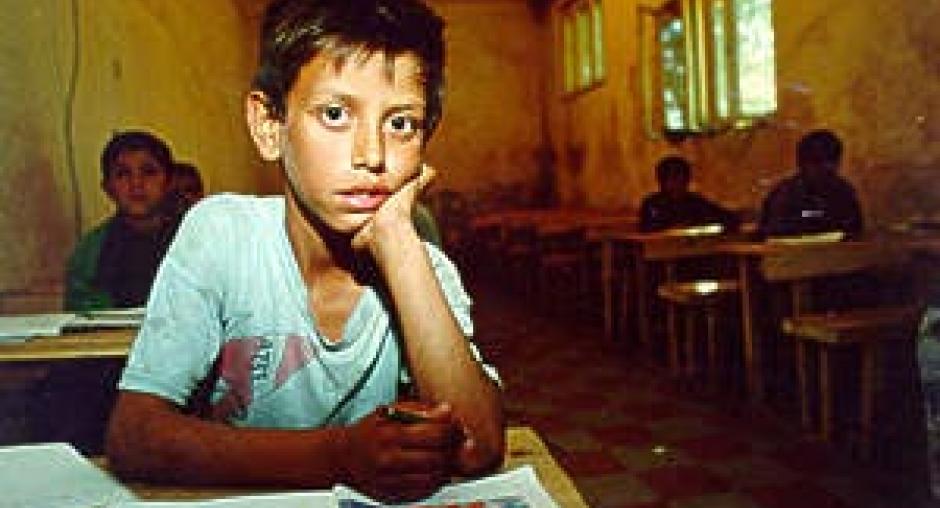Newsroom
OSCE supports stronger Roma representation in Bosnia and Herzegovina
SARAJEVO 12 November 2001

The project aims to improve the status of Roma in Bosnia and Herzegovina. (Lubomir Kotek/OSCE) Photo details
SARAJEVO, 12 November 2001 (OSCE) - The OSCE Mission to Bosnia and Herzegovina has launched a new project aimed at improving the status of Roma in the country at a conference held in Vogosca, from 9 to 12 November 2001.
The project, "Opening Doors: Strengthening Roma Capacity and Ensuring Access to Government", is a joint initiative of the Mission, the OSCE Office for Democratic Institutions and Human Rights (ODIHR), the Council of Europe and the Open Society Institute Roma Participation Programme, and part of the Joint ODIHR, Council of Europe and European Commission Programme Roma under the Stability Pact for South-eastern Europe.
As the largest minority in the country, and a socially, economically and politically marginalized group, issues of concern to the Roma range from education, discrimination in employment, housing and property needs, to the revival of Roma culture and language. The conference brought together 22 Roma NGOs from throughout the country and touched upon all these issues.
The delegates developed a national strategy for Roma issues and elected a representative body of nine persons, which will work with the Government of Bosnia and Herzegovina in implementing the strategy and co-ordinate the activities of Roma NGOs in Bosnia and Herzegovina.
At a meeting with government authorities to take place today, 12 November, the establishment of a National Advisory Board on Roma Issues will be discussed. Participants will include Ms. Kadrija Haracic-Sabic, Bosnia and Herzegovina Deputy Minister of Human Rights and Refugees, Mr. Michael Guet, Council of Europe Roma Division, Mr. Nikolae Gheorghe, OSCE/ODHIR Advisor on Roma and Sinti issues and representatives of international Roma organizations.
The OSCE established its present Mission to Bosnia and Herzegovina on 18 December 1995. In accordance with the General Framework Agreement for Peace (GFAP), the OSCE Mission activities are to: promote Democratization and the building of a vibrant civil society, foster the development of professional journalism and monitor the rights of journalists, monitor and advance the Human Rights situation, supervise the conduct of Elections, and encourage Regional Stabilization through arms control and confidence and security-building measures. The OSCE Mission continues to work closely with other international organizations and local institutions to implement the Dayton Peace Accords.
The project, "Opening Doors: Strengthening Roma Capacity and Ensuring Access to Government", is a joint initiative of the Mission, the OSCE Office for Democratic Institutions and Human Rights (ODIHR), the Council of Europe and the Open Society Institute Roma Participation Programme, and part of the Joint ODIHR, Council of Europe and European Commission Programme Roma under the Stability Pact for South-eastern Europe.
As the largest minority in the country, and a socially, economically and politically marginalized group, issues of concern to the Roma range from education, discrimination in employment, housing and property needs, to the revival of Roma culture and language. The conference brought together 22 Roma NGOs from throughout the country and touched upon all these issues.
The delegates developed a national strategy for Roma issues and elected a representative body of nine persons, which will work with the Government of Bosnia and Herzegovina in implementing the strategy and co-ordinate the activities of Roma NGOs in Bosnia and Herzegovina.
At a meeting with government authorities to take place today, 12 November, the establishment of a National Advisory Board on Roma Issues will be discussed. Participants will include Ms. Kadrija Haracic-Sabic, Bosnia and Herzegovina Deputy Minister of Human Rights and Refugees, Mr. Michael Guet, Council of Europe Roma Division, Mr. Nikolae Gheorghe, OSCE/ODHIR Advisor on Roma and Sinti issues and representatives of international Roma organizations.
The OSCE established its present Mission to Bosnia and Herzegovina on 18 December 1995. In accordance with the General Framework Agreement for Peace (GFAP), the OSCE Mission activities are to: promote Democratization and the building of a vibrant civil society, foster the development of professional journalism and monitor the rights of journalists, monitor and advance the Human Rights situation, supervise the conduct of Elections, and encourage Regional Stabilization through arms control and confidence and security-building measures. The OSCE Mission continues to work closely with other international organizations and local institutions to implement the Dayton Peace Accords.
